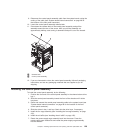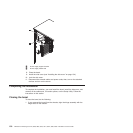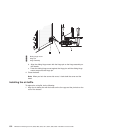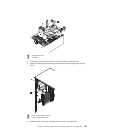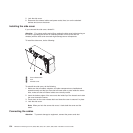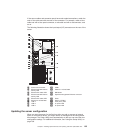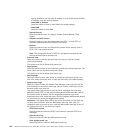
Chapter 6. Configuring the server
The following configuration programs and utilities come with the server:
v Setup Utility
The UEFI (formerly BIOS) Setup Utility program is part of the basic input/output
system firmware. Use it to change the startup-device sequence, set the date and
time, and set passwords. For information about using this program, see “Using
the Setup Utility” on page 138.
v Boot Manager program
The Boot Manager program is part of the server firmware. Use it to override the
startup sequence that is set in the Setup Utility and temporarily assign a device
to be first in the startup sequence. For more information about using this
program, see “Using the Boot Manager program” on page 150.
v Integrated Management Module
Use the integrated management module (IMM) for configuration, to update the
firmware and sensor data record/field replaceable unit (SDR/FRU) data, and to
remotely manage a network. For information about using the IMM, see “Using the
integrated management module” on page 155.
v Remote presence capability and blue-screen capture
The remote presence and blue-screen capture feature are integrated into the
Integrated Management Module (IMM). The virtual media key is required to
enable the remote presence functions. When the optional virtual media key is
installed in the server, it activates the remote presence functions. Without the
virtual media key, you will not be able to access the network remotely to mount
or unmount drives or images on the client system. However, you will still be able
to access the Web interface without the virtual media key. You can order the
optional virtual media key, if one did not come with your server. For more
information about how to enable the remote presence function, see “Enabling the
remote presence feature” on page 156.
v Ethernet controller configuration
For information about configuring the Ethernet controller, see “Configuring the
Broadcom Gigabit Ethernet controller” on page 151.
v LSI Configuration Utility program
Use the LSI Configuration Utility program to configure the integrated SAS/SATA
controller with RAID capabilities and the devices that are attached to it. For
information about using this program, see “Using the LSI Configuration Utility
program” on page 143.
The following table lists the different server configurations and the applications
that are available for configuring and managing RAID arrays.
Table 10. Server configuration and applications for configuring and managing RAID arrays
Server configuration
RAID array configuration
(before operating system is
installed)
RAID array management
(after operating system is
installed)
ServeRAID-BR10i adapter
(LSI 1068) installed
LSI Utility (Setup Utility, press
Ctrl+C)
MegaRAID Storage Manager
(for monitoring storage only)
ServeRAID-MR10i adapter
(LSI 1078) installed
MegaRAID Storage Manager
(MSM), MegaRAID BIOS
Configuration Utility (press C
to start)
MegaRAID Storage Manager
(MSM)
© Lenovo 2009. Portions © IBM Corp. 2009. 137



